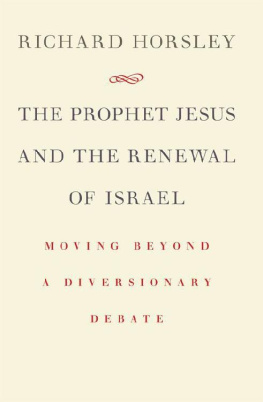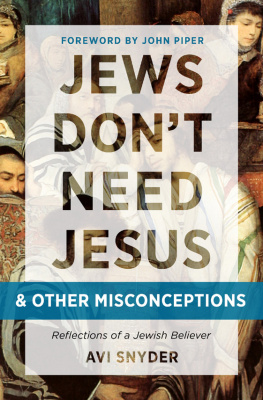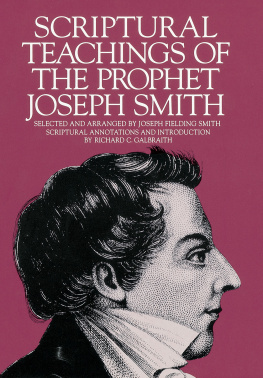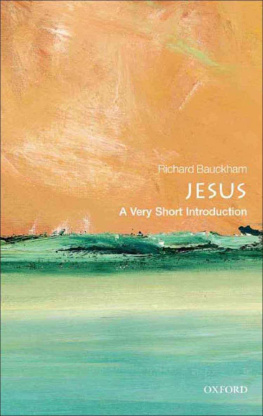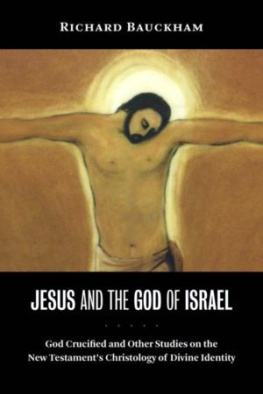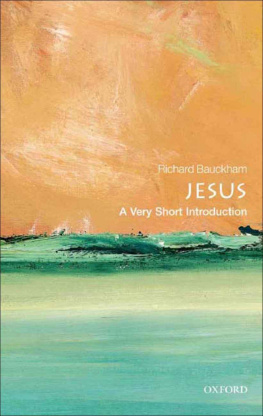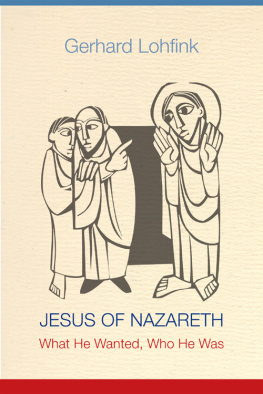In this superbly written and clearly argued little book, Richard Horsley restates his case for a prophetic Jesus actively engaged in the struggle against Roman imperial rule. But this time he brings to the table new claims about method and sharp criticism for both the defenders and opponents of Schweitzers apocalyptic hypothesis.... Scholars and questers of every level of expertise will want to read this new book from one of our most prolific and treasured scholars.
Stephen J. Patterson
Willamette University
Horsley persuasively argues that neither Jesus sayings nor apocalyptic texts (Daniel, 1 Enoch ) envision cosmic catastrophe or the end of the world. Rather, in the midst of historical crises, these texts proclaim judgment of oppressive empires and restoration of the people by God a compelling future on earth.
Barbara R. Rossing
Lutheran School of Theology at Chicago
This stimulating study offers insightful critique, important challenge, and significant results.
Warren Carter
Brite Divinity School
The Prophet Jesus and the Renewal of Israel
Moving Beyond a Diversionary Debate
Richard Horsley
W ILLIAM B. E ERDMANS P UBLISHING C OMPANY
G RAND R APIDS , M ICHIGAN / C AMBRIDGE , U.K.
2012 Richard Horsley
All rights reserved
Published 2012 by
Wm. B. Eerdmans Publishing Co.
2140 Oak Industrial Drive N.E., Grand Rapids, Michigan 49505 /
P.O. Box 163, Cambridge CB3 9PU U.K.
18 17 16 15 14 13 12 7 6 5 4 3 2 1
Library of Congress Cataloging-in-Publication Data
Horsley, Richard A.
The prophet Jesus and the renewal of Israel: moving beyond a diversionary debate /
Richard Horsley.
p. cm.
Includes bibliographical references and index.
ISBN 978-0-8028-6807-7 (pbk.: alk. paper)
ISBN 978-1-4674-3689-2 (mobi)
1. Jesus Christ Historicity. I. Title.
BT303.2.H57 2012
232.908 dc23
2012022083
www.eerdmans.com
Contents
T his book responds briefly and provisionally to what I see as two major problems in current discussion of the historical Jesus. The first is the debate over the apocalyptic Jesus that has dominated recent scholarly debate about Jesus, particularly in the United States. The second is the focus of most investigations of the historical Jesus on the individual sayings of Jesus as part of the dominant individualism of this subfield in New Testament studies.
The first is the legacy of Albert Schweitzer. By the late nineteenth century liberal theology had established a highly influential view of Jesus as a teacher of individual ethics and piety. For liberals, the kingdom of God was within and/or something that would be gradually realized through social progress. The discovery, translation, and examination of more ancient Jewish apocalyptic texts, however, gradually came to convince biblical scholars such as Johannes Weiss and Schweitzer that apocalypticism was dominant in ancient Judaism. In opposition to liberal theology, moreover, they came to believe that Jesus, along with John the Baptist and the early Christians, shared the supposedly widespread Jewish expectation of an imminent time of tribulation, last judgment, and end of the world. After Schweitzers influential sketch of the apocalyptic Jesus, this view of Jesus became dominant for much of the twentieth century. The construction of Jewish apocalypticism that he presupposed, moreover, became consolidated in biblical studies generally, as well as in study of Jesus and the Gospels.
While suspicions about apocalypticism persisted in German theology, the apocalyptic Jesus jumped the Atlantic and became dominant in North American understanding of Jesus. By the late twentieth century, sufficient doubts about Jesus belief in the end of the world had arisen for critical neo-liberals to construct a non-apocalyptic view of the historical Jesus as a teacher of wisdom. Other scholars responded with a strong defense of Schweitzers apocalyptic Jesus. The debate continues, with both sides reasserting their respective views. The American debate at the turn of the twenty-first century is reminiscent of the German Protestant debate at the turn of the twentieth century. Just as Schweitzers apocalyptic Jesus was a reaction to the liberals Jesus, so the neo-Schweitzerians revival of the apocalyptic Jesus is reacting to the neo-liberals non-apocalyptic Jesus.
Significantly, both sides in the American debate over the apocalyptic Jesus continue to assume that apocalypticism was prominent if not dominant in Judaism at the time of Jesus, and that John the Baptist and the early Christians shared in this view. The neo-liberals insist only that Jesus himself and perhaps his first followers somehow cut through the apocalyptic expectation of last judgment and the end of the world.
In the course of the twentieth century, however, biblical studies became an increasingly diverse one might even say splintered field, with many subfields and criticisms. Specialists in one subfield worked independently of those in another subfield. The burgeoning quantity and complexity of scholarship made it difficult for specialists in particular areas to keep up with developments in the others. Of special potential import for debates about the historical Jesus are recent studies of late second-temple Judean texts. The last generation of scholarly specialists have developed a more complex and precise understanding of apocalyptic texts than the portrayal of apocalypticism presupposed by Schweitzer and Bultmann that, with some variations, is still standard in New Testament studies. This raises the question of whether the neo-liberals and the neo-Schweitzerians might be debating more about a century-old scholarly construct of apocalypticism than about different expectations or attitudes attested in the ancient texts.
The second major problem, the focus on individual sayings that has become standard in investigation of the historical Jesus, is illustrated by both the neo-liberal studies and the neo-Schweitzerian presentations. This narrow focus is problematic for a number of reasons. Focus on individual sayings (purposely) isolated from their literary context in the Gospels relinquishes one of the only possible guides to their ancient meaning-context. Into the vacuum come various theological schemes to provide a meaning-context and, in effect, to determine the meaning and/or application. Focus on isolated individual sayings thus makes them easily manipulable as prooftexts for particular concepts or points.
Focus on individual sayings also tends to reify them as statements or principles or precious nuggets of wisdom abstracted from the contingencies of historical life. Tellingly, standard study of the historical Jesus is specially concerned about the transmission of particular sayings, as if they were precious objects being handed (down) from one person to another. The resulting picture of Jesus is as a revealer who, unengaged with concrete historical life, utters one-liners. To have become a historically significant figure, Jesus must have communicated with people, particularly his followers. But it is difficult to imagine that anyone could communicate merely in individual sayings.
In taking individual sayings as the sources or the data for constructing the historical Jesus, standard studies are treating the Gospels as mere collections of individual sayings and small individual stories of various types. In the last generation, however, specialists studying the Gospels are insisting that they are sustained narratives, whole stories about Jesus and his mission, and not mere collections of Jesus-traditions. The standard focus on individual sayings, working with an understanding of the Gospels from over a generation ago, may be ignoring the literary integrity of the Gospels as the principal sources for the historical Jesus.




